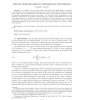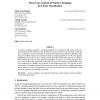653 search results - page 43 / 131 » Using common random numbers for indifference-zone selection |
ICPR
2000
IEEE
14 years 8 months ago
2000
IEEE
We studied a number of measures that characterize the difficulty of a classification problem. We compared a set of real world problems to random combinations of points in this mea...
SIAMSC
2010
13 years 6 months ago
2010
A method for moving least squares interpolation and differentiation is presented in the framework of orthogonal polynomials on discrete points. This yields a robust and efficient ...
EKAW
2000
Springer
13 years 11 months ago
2000
Springer
Knowledge refinement tools rely on a representative set of training examples to identify and repair faults in a knowledge based system (KBS). In real environments it is often diffi...
EDBT
2010
ACM
13 years 11 months ago
2010
ACM
Recently, there has been growing interest in random sampling from online hidden databases. These databases reside behind form-like web interfaces which allow users to execute sear...
JMLR
2006
13 years 7 months ago
2006
A selective sampling algorithm is a learning algorithm for classification that, based on the past observed data, decides whether to ask the label of each new instance to be classi...


